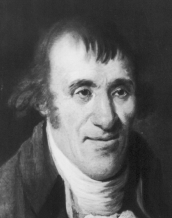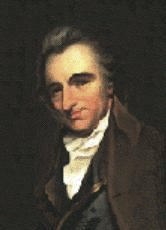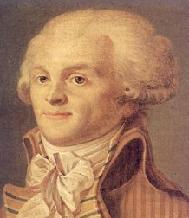PEOPLE OF IDEAS

THE WESTERN ENLIGHTENMENT
(Mid-1600s to Late 1700s)
By Alphabetical Order:
A
d'Alembert,
Jean
Le Rond
Allen,
Ethan
Astruc,
Jean
B
Bayle,
Pierre
Bengal,
Johann
Albrecht
Bentham,
Jeremy
Berkeley,
George
Bolingbroke,
Henry
Saint
Boyle,
Robert
Burke,
Edmund
C
Chauncey,
Charles
Condorcet
D
Descartes,
René
Diderot,
Denis
E
Edwards,
Jonathan
Eichhorn,
Johann
Friedrich
F
Fénelon,
François
Fox, George
Francke,
August
Hermann
Franklin,
Benjamin
G
Gibbon,
Edward
Grotius,
Hugo
Guyon,
Madame
H
Hamilton,
Alexander
Harrington,
James
Helvitius
(Claude Adrien)
Herbert of
Cherbury,
Herder,
Johann
Gottfried
Herschel,
William
Hobbes,
Thomas
d'Holbach,
Baron
Hume,
David
Huygens,
Christian
J
Jefferson,
Thomas
K
Kant,
Immanuel
L
Laplace,
Pierre
Simon de
Law,
William
Leeuwenhoek,
Anton
van
Leibniz,
Gottfried
Wilhelm
Lessing,
Gotthold
Ephraim
Locke, John
Lowth,
Robert |
M
Malebranche,
Nicholas
Mather,
Cotton
Milton,
John
Montesquieu,
Baron
de
N
Newton, Isaac
P
Paine,
Thomas
Paley,
William
Priestley,
Joseph
R
Ray,
John
Reid,
Thomas
Reimarus,
Hermann
Samuel
Rousseau,
Jean-Jacques
S
Shaftesbury,
The
Earl of
Smith,
Adam
Spener,
Philip
Jacob
Spinoza,
Benedict
(Baruch)
Swedenborg,
Emanuel
T
Tennent,
Gilbert
Tindal,
Matthew
Toland,
John
Turgot
V
Vico,
Giambattista
Voltaire
(François-Marie
Arouet)
W
Wesley,
John
Wesley,
Charles
Wettstein,
Johann
Jakob
Whitfield,
George
Whitney,
Eli
Wolff,
Christian
Woolston,
Thomas
Z
Zinzendorf,
Count
Nikolaus
|
THE PLEA FOR TOLERANCE AND A JUST ORDER
(Mid-1600s) |
René
Descartes (1596-1650)
 Galileo's and Kepler's work
coincided in its timing almost exactly with the work of another early 17th
century figure: René Descartes. In some ways Descartes was
a medieval rationalist – who believed (in keeping with Plato) that all things
in the world around us are merely "extensions" of some variety of mathematical
or geometric abstractions. The underlying truth about our world "out there"
was discoverable really only through careful mathematical meditations on
that world – which could be done at home or in one's closet. Galileo's and Kepler's work
coincided in its timing almost exactly with the work of another early 17th
century figure: René Descartes. In some ways Descartes was
a medieval rationalist – who believed (in keeping with Plato) that all things
in the world around us are merely "extensions" of some variety of mathematical
or geometric abstractions. The underlying truth about our world "out there"
was discoverable really only through careful mathematical meditations on
that world – which could be done at home or in one's closet.
But in any case, what he
came up with in his musings was the idea that the world "out there" was
essentially a mechanical device that worked according to fixed rules of
motion. Events occurred as the result of impacts among the various bodies
that are in constant motion within this "machine." The machine itself
is devoid of soul or vitality of its own. It simply responds to the "laws"
of motion in a mathematical way.
But that left the question
of the human soul and will – and the divine soul and will. Where do we fit
in? Are we merely elements of this mechanical world? Is God merely an element
of the mechanical world? To Descartes the answer was clearly a "no" to
both questions.
But in affirming our own
vitality – and God's – Descartes was forced to separate the human soul (and
God's) from that soul-less mechanical creation "out there." Fine. But how
then were we connected to that world – except as removed observers? Where
was our ancient sense of unity with all creation? Where in fact did that
leave us in relation to God – and to each other?
Those questions were never
adequately answered. The human soul seemed to be left cut adrift by what
was considered a very compelling philosophical statement – one which swept
powerfully through the philosophical circles of Europe in those days.

 Descartes'
major works or writings: Descartes'
major works or writings:
Discourse
on the Method (1637)
Meditations on the
First Philosophy (1642)
Principia Philosophiae
(1644)
Benedict
(Baruch) de Spinoza (1632-1677)

Spinoza was born of Jewish parents
who had escaped the Inquisition in Portugal by coming to Amsterdam where
Baruch (Latin: Benedictus) was born. Spinoza was a very unorthodox
thinker – and his ideas eventually got him expelled from the Jewish community
(1656). Because he saw God as present in everything – as the source
and essence of all substance – he was viewed variously as a pantheist, a
materialist, an atheist.
He was a moral relativist,
who did not believe in some set of transcending religious or civil laws
that we ought to conform ourselves to, but who instead believed in following
out our own natural personal imperatives – that noone else had a right to
pass judgment on.
This was not a philosophy
designed to make the religiously conservative community around him very
happy. But it certainly spoke to those souls who
were tiring rapidly of the mean spiritedness of the religiously orthodox – a
growing number of youthful minds who hoped to rise
to truths which were vastly higher than the traditional variety that had
brought Europeans to war against
each other mercilessly.

 Spinoza'
major works or writings: Spinoza'
major works or writings:
A Short Treatise
on God, Man and his Well-Being
Tractatus de Intellectus
Emendatione (Treatise On the Improvement of the Understanding)
(1661-1677)
Tractatus Theologico-Politicus(Treatise
on Theology and Politics) (1670)
Ethics (1663-1675,
1677)
Gottfried
Wilhelm Leibniz (1646-1716)

German mathematician and rationalist
philosopher – who, simultaneously with Newton, invented the differential
and integral calculus. He was a widely talented and travelled individual – and
kept up friendships and correspondences with a wide range of scientists,
philosophers and political figures of the day.
Leibniz was born and educated
in Leipzig, eventually studying law at the University of Leipzig.
From 1667 to 1672, he worked for the Elector of Mainz as a lawyer and diplomat.
He travelled widely coming
into close contact with a number of political and scientific luminaries
of his day. In 1762 me travelled to Paris where he came into contact
with Huygens, and Malbranche. His travels also took him to England
(1673, 1676) and to Amsterdam (1673), where he spent time with Spinoza.
During these days he began his work on the calculus.
In 1676 he went to work as
a librarian to the Duke of Brunswick, and took up work on a number of mechanical
devices that utilized his mathematical and technical talents. But
he also turned his attention to philosophy, completing works on metaphysics
and systematic philosophy during the 1680s and 1690s.
 Leibniz'
major works or writings: Leibniz'
major works or writings:
Hypothesis
Physica Nova (New Physical Hypothesis) (1671)
Discours de métaphysique
(Discourse on Metphysics) (1686)
The New System
(1695)
Nouveaux Essais sur
L'entendement humaine (New Essays on Human Understanding) (1705)
Théodicée
(Theodicy) (1710)
The Dialogues of Hylas
and Philonous (1713)
The Monadology(1714)
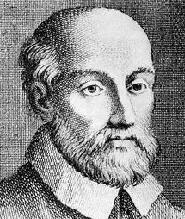
Giambattista
Vico (1668-1744)
Italian philosopher of history
and society – though he also had wider interests in mathematics and linguistics.
 Vico's
major works or writings: Vico's
major works or writings:
New Science
(Scienza Nuova)
|
|
THE EARLY EMPIRICISTS
(1600s) |
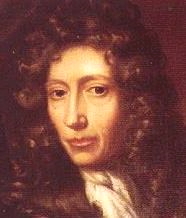 Robert
Boyle (1627-1691)
Robert
Boyle (1627-1691)
Boyle is considered the "Father"
of modern chemistry. He was one of the "virtuosi" of the Royal Society.
He viewed the scientific enterprise as a confirmation of the providential
hand of God. To him, science and theology did not contradict – but spoke
to one single truth in God.
 Boyle's
major works or writings: Boyle's
major works or writings:
New Experiments
Physico-Mechanical (1660)
The Sceptical Chemist
(1661)
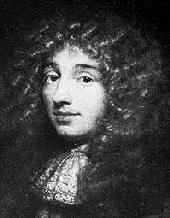
Christian
Huygens (1629-1695)
A Dutch physicist who made a
number of contributions to science in a number of different subfields.
He developed the pendulum clock, the telescope, and added to our knowledge
of the planet Saturn and its satellite rings and moons.
He is perhaps most notable
for his theory that light functioned as a wave rather than as particles
(in contrast to Newton). He claimed that light moved along a vibrational
path through invisible ether to reach the eye and produce vision.
 Huygens'
major works or writings: Huygens'
major works or writings:
Horologium
oscillatorium (1658)
Systema Saturnium
(1659)
Treatise on Light
(1690)
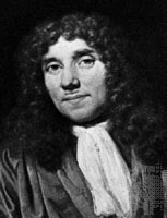
Anton
van Leeuwenhoek (1632-1723)
studied microscopic life
Isaac
Newton (1642-1727)

Toward the end of the 1600s
Newton picked up on Descartes' theories of motion and completed the mechanistic
vision of the universe that he had laid out. In his Principia (1687)
he so thoroughly pulled the mechanistic vision together that it became
the single most important foundation piece for the modern world-view.
He "demonstrated" that all
things within the universe are made up of minute bits of matter which are
held together in their shape and movement through the force of natural
attraction or gravity (the gravitational attraction of two bodies is equal
to the product of their mass divided by the square of the distance between
them). This theory explained quite fully everything from the movement of
the planets through the skies, to the movements of the tides, to the velocity
of falling objects – and more.
Just as importantly – the
completeness of the theory left no possibility of seeing creation as a
"living" thing. Creation was without life of its own; it was instead mere
"matter" responding mechanically to a set of fixed mathematical laws.
Nonetheless, Newton thought
of himself as being religiously quite devout. His theory of the universe
– so he thought – was intended as a powerful tribute to the Grand Architect
who designed such a wonderfully complex yet beautiful creation.
However, Newton depicted
God in such a way that God actually lost "personality" and the realm of
sovereign action. God was left a role in nature largely as "First Mover"
with no further significant intervention in life. God nearly became identified
with the eternity or infinity of the universe.

 Newton's
major works or writings: Newton's
major works or writings:
Philosophiae
Naturalis Principia Mathematica (The Principia) (1687)
Opticks (1704)
Isaac Newtown's Papers
and Letters on Natural Philosophy [Collection] (ed. Cohen: 1952)
John
Locke (1632-1704)

Very shortly after Newton's
Principia
was published, Locke published his Essay on Human Understanding
(1690).
Locke brought the human mind
into this mechanical world by positing a theory of knowledge in which the
mind at birth is simply a blank receptacle, possessing no "innate" ideas.
Over the years the mind has data added to it from the outside world. This
comes in the form of "sensations" that strike this blank mind through the
sensory devices of sight, hearing, feeling, taste, and smell.
These data in turn are developed
into full ideas by the mechanism of the mind, which sifts this imported
information in the search for the agreement or disagreement of two thoughts
or idea. From this mental process develops a well articulated vision of
the world around us – and its causes and effects.
As far as "moral" ideas were
concerned, Locke felt that prudence and long-term self-interest would serve
the rational mind as the determiner of human action.
This theory of human knowledge
stood in strong distinction to the traditional understanding that the mind
possessed fully – even at birth – a vast store of innate understanding that
was vitally a part of its soul quality. The old theory accounted for "learning"
by seeing the task not one of inserting information from the outside (as
per Locke – and almost every Western educator since), but instead one of
drawing out (thus the ancient word "education" which means "draw out")
the wealth of innate understanding already present in the human soul. One
didn't make discoveries about things "out there." A person made discoveries
about things already located deep down inside oneself.
Though Locke's theory could
offer no hard evidence that what he hypothesized was indeed true – the time
was ripe for such a theory. "Science" was rapidly stripping life of the
sense of "soul" or "sacredness" to it. The wars of religion had also helped
immeasurably. So Locke's theory "made sense." That was all that was needed
to leave a lasting impression on the rapidly shifting world-view of the
West.

 Locke's
major works or writings: Locke's
major works or writings:
Two
Treatises of Government (1689)
A
Letter Concerning Toleration (1689,
1690, 1692)
An
Essay on Human Understanding (1690)
Education (1693)
The Reasonableness
of Christianity (1695)
|
|
NATURAL" RELIGION (DEISM) AND
PHILOSOPHY
(Late 1600s to Early 1700s) |
Lord Edward
Herbert of Cherbury (1583-1648)
He saw little role for revelation
in the quest for truth. He believed that all humans are naturally
endowed with intuitive ways that linked them to God through simple faith
and moral action. Human reason, not religious revelation, was then
a more reliable means of perfecting and fulfilling these natural,
intuitive ways.
Herbert is quite justly considered
the "father" of English deism.
 Herbert's
major works or writings: Herbert's
major works or writings:
De Veritate
(On
Truth)
(1624)
De Causis Errorum
(On
the Causes of Errors)
(1645)
De Religione Laici
(On
the Religion of the Laity)
(1645)
De Religione Gentilium
(On
the Religion of the Gentiles)
(published posthumously in 1663)
Autobiography
(ending with the year 1624; published posthumously in 1764)
John Ray
(1627-1705)
An English Puritan and a botanist/biologist.
He made tremendous contributions to the work of classifying plant and animal
life into families by way of their structure.
As a devout Christian he
put forth the "argument from design" for the existence of God: viz.,
surely such precision and order in the natural life necessitated an intelligent
being as creator of the universe.
 Ray's
major works or writings: Ray's
major works or writings:
Catalogus
Plantarum Angliae (Catalog of English Plants)
(1670)
Methodus Plantarum
Nova (1703)
Historia Plantarum
(3 vols: 1686-1704)
The Wisdom of God
Manifested in the Works of Creation(1691)
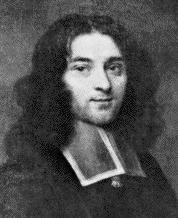
Pierre
Bayle (1647-1706)
A French philosopher living
in the Netherlands who was highly critical of traditional Christian doctrines
and teachings. In his Dictionary he lampooned Christian beliefs – and
called for toleration of all viewpoints, even atheism. He believed
that human reason, not religious revelation, was the only reliable source
of truth.
 Bayle's
major works or writings: Bayle's
major works or writings:
Philosophical
Commentary on the Words of the Gospel (1686)
Historical and Critical
Dictionary (1697)
John Toland
(1670-1722)
Knowledge derived largely only
through human reason. There was only a very reduced role for divine revelation.
Toland opened the deistic controversy in England
 Toland's
major works or writings: Toland's
major works or writings:
Two Letters
from Oxford
(1695)
Christianity not Mysterious
(1696)
Amyntor (1698)
Letters to Serena
(1704)
Adeisidæmon
(1709)
Nazarenus
(1718)
Pantheisticon
(1720)
Tetradymus
(1720)
The Primitive Constitution
of the Christian Church (1726)
Matthew
Tindal (1655-1733)
 Tindal's
major works or writings: Tindal's
major works or writings:
Essay concerning
the Power of the Magistrate (1697)
The Rights of the
Christian Church asserted (1706)
The Nation Vindicated
(1711)
Christianity as Old
as the Creation (1730) [something of an official "Deist Bible"
in his time. Here Tindal lays out the argument that all that is valuable
in Christianity is that which universal reason alone would hold true.
All else (i.e. revelation) is superstition – the most evil form of subjugation
of the human mind.]
Thomas
Woolston (1670-1733)
Woolston debunked the miracle stories
of Jesus and the resurrection accounts in Scripture – on the basis of rationalist
arguments.
 Woolston's
major works or writings: Woolston's
major works or writings:
Six Discourse on the
Miracles of Our Savior (1727-1729)
Two Defences (1729-1730)
The Earl
of Shaftesbury (1671-1713)
(Anthony Ashley Cooper)
He was interested in formulating
new sciences of ethics and of esthetics – based not on any kind of imposed
norm, such as divine command, but upon the "natural" inclinations of man.
His definition of the "good" or "desireable" was ultimately related to
that which makes a person truly "happy." In this sense he was part
of the newly arising age which began all logic from the point of view of
personal human experience. What was good or true was that which was
personally good and true for me.
Nonetheless he attempted
to anchor this self-centered ethic in loftier holding-ground. Thus
he related the notion of what it is that makes a person happy to certain
natural harmonies in human life. Such harmony was characterized by
a moderation in all things. Thus for instance the emotions were not
to be denied – but kept in their natural place by the power of human reason,
being allowed to arise only in a manner appropriate to their nature:
ie., anger only when and to the extent anger was reasonably appropriate.
He also tried to anchor this
self-centered ethic in our natural sense of conscience – which was a facet
of our social nature as humans. Thus human reason, which was
supposed to be the directing force in our lives, was closely connected
to our common human experience – and was not merely the result of our personal
inclinations to do this or that. In that sense also human "happiness"
was understood to be a part of life's natural harmony, a harmonization
of our personal inclinations with the larger social experience: ie.,
our instinct for "sympathy."
In any case nothing in his
moral-ethical or esthetic system depended upon "authority" for it to work.
It supposedly all flowed out of the natural instincts of human nature and
the harmonies those produced when allowed free play. This was quite
a radical challenge to the older Christian interpretation of human nature – with
its vision of original sin built into the human character. It moved
in a direction opposite Christianity's traditional view that goodness flows
out of God's judgments alone and finds its place in our midst only through
the discipline of God-fearing authority.
Shaftesbury's arguments seemed
so persuasive to the 18th century that his book Characteristics
(1711) underwent eleven editions during that century.
 Shaftesbury's
major works or writings: Shaftesbury's
major works or writings:
Inquiry Concerning
Virtue or Merit (1699)
Characteristics
(1711)
Henry
St. John Bolingbroke (1678-1751)
 Bolingbroke's
major works or writings: Bolingbroke's
major works or writings:
Letters on
the Study and Use of History (2 vols: 1735; published 1752)
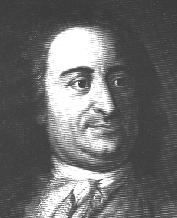
Christian
Wolff (1679-1754)
|
|
REACTION TO "NATURAL" RELIGION OR DEISM
(Late 1600s to Early 1700s) |
ON-GOING CHRISTIAN PIETISM
(Late 1600s to Early 1700s) |
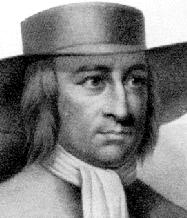
George
Fox (1624-1691)
founder of Quakers
 Fox's
major works or writings: Fox's
major works or writings:
Autobiography
Philip
Jacob Spener (1635-1705)
German Pietist who attempted
to move the Christian life away from the Lutheran focus on the church's
ecclesiastical doctrine and sacraments – toward a personal relationship
with God through small group prayer and study of Scripture. He also
promoted a simple life-style and abstinence from certain social "frivolities"
(dancing, card-playing, theater-going) as a mark of piety.
 Spener's
major works or writings: Spener's
major works or writings:
Pia Desideria
(1675)
August
Hermann Francke (1663-1727)
Francke
picked up on the pietist concept from Spener and amplified it by giving
it wide applications in the area of charity work. He was a German
university professor who was hounded from university to university by Lutheran
authorities until he was invited by Frederick I of Prussia to take up a
professorship at the new University of Halle. Here he helped developed
the university into a mainstay of German pietism – and gave pietism a missionary
quality. As a pastor in nearby Glaucha he also established an orphanage
and school (the Paedagogium) for poor children – the latter of which
eventually was schooling over 2,000 children. This became a model
for other pietist missions.
Madame
Guyon (1647-1717)
A Christian mystic: a
quietist who believed that total surrender of the human will to the will
of God, with an accompanying total indifference to the things of the world,
was the path to a perfect union with God.
She was born Jeanne-Marie
Bouvier de La Motte. At age 16 she married Jacques Guyon, Lord of
Chesnoy. He died 13 years later –and after a further 5-year period
of spiritual training under the quietist Friar François Lacombe,
she left her children and began travels in quest of her own spiritual perfection.
The Catholic Church intensely
disliked quietism (Lacombe was arrested in 1687 and died soon thereafter
in prison) and on two occasions she was imprisoned for her beliefs and
writings. The first period (1688) was brief, for Louis XIV's second
wife, Mme de Maintenon, intervened to have her released after only three
months in prison. But the church was adamant in its opposition of
quietism and in 1695 called her disciple, abbot Fénelon,
to make a defense of their works. However, quietism was offically
condemned by the church and Mme. Guyon was arrested – and held in prison
until 1703. She lived out the rest of her life in Blois, trying to
avoid attention yet continue her writings, which were voluminous. Mme.
Guyon's major works or writings: Mme.
Guyon's major works or writings:
Moyen court
et très facile de faire oraison
(The Short and Very Easy
Method of Prayer)
(1685)
Madame de la Mothe Guion
(Autobiography of Madame
Guyon)
François
Fénelon (1651-1715)
French Catholic quietist (condemned
in 1687)
 Fénelon's
major works or writings: Fénelon's
major works or writings:
Spiritual
Progress
Les aventures de Télémaque
(1699)
Cotton
Mather (1663-1727)
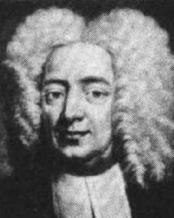
Cotton Mather, son of the Puritan
minister and Massachussetts political leader, Increase Mather, became himself
the leading Puritan minister in Massachussetts at the end of the 1600s
and beginning of the 1700s.
He was a prolific writer
and researcher of wide interest – from modern science and medicine to witchcraft.
Like his father, he was particularly interested in shaping and directing
a model Christian (Puritan) commonwealth in Massachussetts. However
he himself lived long enough to watch with sadness as the once strong piety
of his countrymen faded into religious indifference.
At the same time, though
he was a deeply pious Puritan, he took on some of the ideas about God that
were gradually being put forth by the deists.
 Mather's
major works or writings: Mather's
major works or writings:
Magnalia
Christi Americana (1702)
Bonifacius,
or Essays to Do Good (1710)
Curiosa
Americana (1712-24)
Christian
Philosopher (1721)
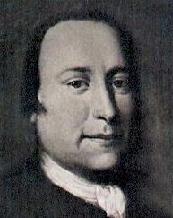
Count
Nikolaus Ludwig von Zinzendorf (1700-1760)
Sponsor of Moravians |
|
THE GREAT AWAKENING
(Mid-1700s) |
Gilbert
Tennent (1703-1764)
Tennent was a Presbyterian
"New Sider." He favored revival and opposed the Calvinist formalism
of the "Old Sider" Scotch-Irish Presbyterians of the middle colonies (Pennsylvania
and New Jersey)
|
|
CHRISTIAN MYSTICISM
IN THE AGE OF REASON |
Emanuel
Swedenborg (1688-1772)
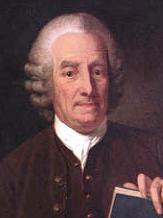
Swedish scientist and mystic.
Swedenborg was born to a
Swedish family headed by a father who was a chaplain to the Swedish king,
a teacher of theology at the University of Uppsala – and later a Lutheran
bishop.
Swedenborg graduated from
the University of Uppsala in 1709 and travelled through Europe for the
next five years. He took a particular interest in mathematics and
the natural sciences and studied these subjects in England, Holland and
France, bringing him into contact with some of the notable mathematicians
and scientists of his day.
Upon his return to Sweden
he edited Sweden's first scientific journal,
Daedalus Hyperboreus. He
eventually took up minerology (serving for a lengthy period of time as
royal assessor at the Royal Board of Mines), branched from there to astronomy,
mathematics and scientific cosmology. His encyclopedic mind led him
in 1734 to publish Opera Philosophica et Mineralia.
Then he turned his thoughts
to physiology and psychology – in particular the workings of the brain and
how this connected to the "soul" of the person. Thus in 1740-1741,
during another trip abroad, he published in Amsterdam
Oeconomia Regni
Animalis (The Economy of the Animal Kingdom)
He then branched into the
study of language and symbolism – leading him eventually to come to the
view that "reality" was in fact a complex array of symbols corresponding
to deeper spiritual realities – a view not unlike that of Pythagoras and
Plato.
A deeply mystical religious
experience of his in 1743 led him to take note of his dreams and particular
visions – including visions of Jesus Christ (Journal of Dreams: 1743-1744)
. With the second of these visions of Christ, he gave his energies
over entirely to the pursuit of spiritual matters, in particular the ways
in which spiritual reality reveals itself symbolically in divine revelation.
He put this thinking to work
in his Arcana Caelestia (8 vols: 1749-1756), reviewing the first
five books of the Old Testament, the Books of Moses. His goal was
to demonstrate how a deeper spiritual reality flows beneath the natural
reading of the text – showing the correspondence between the two levels.
In 1758 he published his De Coelo et ejus Mirabilibus et de Inferno
(On
Heaven and Its Wonders and on Hell) – certainly his most well-known work. To Swedenborg, the fundamental
reality of all things was God – summed up as Divine Wisdom and Love.
Physical or natural reality was in fact an extension, an outworking of
these two elements of God. Human freedom and self-absorption had
over the aeons progressively damaged the relationship that had one existed
between man and God, corrupting human wisdom and love – until Jesus Christ
reopened the way back to full relationship, full correspondence between
human love and wisdom and Divine Love and Wisdom.
Even this too had become
corrupted – by the Christian community itself – pointing to the need of Christ's
second coming, which Swedenborg felt was at hand. The growth of the
enlightenment seemed to Swedenborg to point to the immediacy of this event.
Swedenborg felt that he had
been specially called by God to bring forth this good news – and saw his
own writings as a crucial part of this wonderful event of Christ's second
coming.
In his lifetime he had succeeded
in drawing around him devotees who in the next 10-20 years after his death
formed up religious associations known as the Church of the New Jerusalem
or New Church. His followers were also sometimes called "Swedenborgians."
But his influence extended well beyond this group of disciples – to many
within the Romanticist movement that began to emerge during the late 1700s
and which blossomed in the 1800s. In particular, Honoré de
Balzac, Charles Baudelaire, Ralph Waldo Emerson, William Butler Yeats and
August Strindberg acknowledged an intellectual indebtedness to him.
 Swedenborg's
major works or writings: Swedenborg's
major works or writings:
Opera Philosophica
et Mineralia (3 vols: 1734)
Oeconomia Regni Animalis
(The Economy of the Animal Kingdom) (2
vols: 1740-1741)
Journal of Dreams
(1743-1744)
Regnum Animale
(The Animal Kingdom)
(2 vol.: 1744-45)
The Worship and Love
of God
Arcana Caelestia (Heavenly
Arcana) (8 vols: 1749-56)
De Coelo et ejus Mirabilibus
et de Inferno (Heaven and its Wonders and Hell From Things
Seen and Heard) (1758)
Amor Conjugialis (Conjugal
Love) (1768)
Apocalypsis Explicata
(Apocalypse Explained)
(4 vol: 1785-89)
Vera Christiana Religio
(True Christian Religion)
(1771) |
|
LATER DEISM AND EARLY BIBLICAL
CRITICISM
(Mid to Late 1700s) |
Johann
Jakob Wettstein (1693-1754)
A Biblical scholar in Basel/Amsterdam.
 Wettstein's
major works or writings: Wettstein's
major works or writings:
Prolegomena
ad Novi Testamenti graeci (1730)
outlining his ideas on text-criticism used eventually to produce his Greek
NT (1751-1752)
Libelli ad Crisinatque
Interpretationem Novi
Testamenti which stressed the importance of understanding the historical
setting for the life of Jesus and the apostles; also stressed the importance
of the study of rabbinic literature as an aid in proper exegesis of the
Gospels.
Johann
Albrecht Bengal (1687-1752)
 Bengal's
major works or writings: Bengal's
major works or writings:
Gnomon Novi
Testamenti
(1742) a pietist's use of text-criticism and philological
study to explore the deeper or hidden meanings of Scripture as a devotional
aid.
Jean Astruc
(1684-1766)
Professor of medicine at Paris
 Astruc's
major works or writings: Astruc's
major works or writings:
Conjectures
sur les memoires originaux (1753)
[literary analysis (use of different names for God, etc.) seems to point
to two main sources for Genesis, plus two secondary sources and signs of
the presence of a dozen other documents in its composition.]
Robert
Lowth
bishop of London
 Lowth's
major works or writings: Lowth's
major works or writings:
De Sacra Poesi
Hebraeorum (1753) applied his knowledge of Greek and Latin poetry
to the study of Hebrew poetry, not only with reference to technical aspects
of the language (parallelism, etc.) but also to the poetic spirit of the
material.
Hermann
Samuel Reimarus (1694-1768)
professor at Hamburg
 Reimarus'
major works or writings: Reimarus'
major works or writings:
Fragmente
des Wolfenbuttelschen Ungenanten (published post-humously by Lessing
in 1774-1778) Reimarus "defended" the faith through a deistic affirmation
of creation as the true miracle of God; the other miracles stories of Scripture
are demeaning of God's grandeur – only fraudulent accounts of religious
enthusiasts.
Gotthold
Ephraim Lessing (1729-1781)
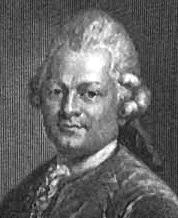
Lessing equated the progress
of the human race with the progress of the individual from childhood through
youth to manhood. The Old Testament belongs to the childhood of man:
teaching strict rules of imposed discipline. The New Testament belongs
to the youth of mankind: teaching self-sacrifice and self-discipline in
favor of future success and benefits. Manhood is characterized by
duty, without immediate rewards: it is guided solely by reason – though
God may yet send new revelation to aid in the development of this stage
of human existence. In any case, though Scripture is invaluable in
our early development – it is less useful (belonging to an inferior past)
in guiding the present. Human reason is a higher guide.
 Lessing's
major works or writings: Lessing's
major works or writings:
Education
of the Human Race (1780)
Johann
Gottfried Herder (1744-1803)
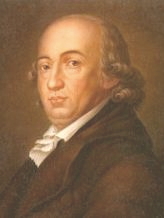
The clergyman Johann
Gottfried Herder studied under Kant at Königsberg ... but moved away
from Kantian rationalism into a mystical world presided over by
God. As a young pastor he met Goethe, inspiring the latter with
his insights into Biblical literature. He recognized that the
Hebrew literature of the Old Testament was more of the nature of poetry
and folk narrative than technical science (which was how rationalist
Western society was coming to think and operate at that point) ... and
that it was necessary to understand the Hebrew writings as such in
order to comprehend their great ‘truths.’
The two men
became good friends whose speculations together about human knowledge
birthed the Sturm und Drang (Storm and Drive) movement of the 1770s,
elevating human emotions above human intellect. Eventually their
thinking would settled down a bit and evolve towards Classicism, or
love of the styles of classical or ancient Greco-Roman antiquity in an
attempt to balance human emotion and human intellect.
Herder
was a strong German nationalist ... at a time when Germans were
attempting to construct the idea of a German nation (Germany at the
time was divided into hundreds of independent states, large and
small). Yet he was cautious about letting the highly emotional
spirit of nationalism get too far away from practical reason.
Then
with the outbreak of the French Revolution in 1789 Herder would support
the Revolution, producing a split between himself and many of his
friends, including Goethe. Finally his dedication to refuting
Kant’s theories would place him pretty much in isolation within the
German academic community.
 Herder's
major works or writings: Herder's
major works or writings:
Vom Geist
der Ebräischen Poesie (1782-1783)
disclosed how the Hebrew writings were written in a poetic vein (typical
of the ancient Near East) and had to be read as such – not technically (the
way moderns were tending to write and think)
Joseph
Priestley (1733-1804)
chemist; unitarian clergyman
William
Paley (1743-1805)
Paley put forth a "natural-theology"
defense of God based upon the self-evident complexity of the world – the
logic that such a beautiful creation could not be the result of anything
else except an all-powerful, all-caring God. He uses the analogy
of the watch: the complexity of a watch automatically or necessarily
points to the existence of a watch-maker. God is the "watch-maker"
of the universe.
 Paley's
major works or writings: Paley's
major works or writings:
Natural Theology
(1802)
Johann
Friedrich Eichhorn (1752-1827)
Professor at Göttingen
 Eichhorn's
major works or writings: Eichhorn's
major works or writings:
Einleitung
ins Alte Testament (1770-1773)
Ueber Mosis Nachrichten(1779)
both were major works on literary-criticism of the Old Testament
|
THE FRENCH
PHILOSOPHES
(Mid to Late 1700s) |

Baron
de Montesquieu (1689-1755)
 Montesquieu's
major works or writings: Montesquieu's
major works or writings:
Spirit
of the Laws (1748)

Voltaire
(François-Marie Arouet) (1694-1778)
 Voltaire's
major works or writings: Voltaire's
major works or writings:
Candide
The Philosophical
Dictionary
Jean-Jacques
Rousseau (1712-1778)

Rousseau was French philosopher (actually he was French-cultured Swiss) whose writings, especially The Social Contract
(1762), were very popular in France. He raised the question of
political sovereignty – where it was lodged and how it functioned to
best serve the people.
Rousseau claimed that originally
man lived in some kind of simple natural state of harmony, without laws
or government. But life had evolved over time into a more complex
form – civilization – requiring as it developed greater mutual
dependence among men for the orderly working of society ... and thus
also a more complex system of moral instruction or law to guide this
more complex society. Man accordingly had to give up his total
personal sovereignty to come under the protection and nurture of more
complex society. But he was giving it up not to some ruling
individual but to the larger idea of the society as a whole, the
‘general will’ – in particular its laws, which were the clearest
expression of a people’s general will.
The laws, not any
particular individuals, were the locus of sovereignty in the truly good
society. Unfortunately ignorance of this good had clouded
people’s political understanding – allowing them to slip into all forms
of political tyranny.
Rousseau’s hope was to open men’s
eyes to the understanding of what was truly right and good about
society, that such knowledge would free men to usher in a good or
utopian society that was truly their right to enjoy. All the
superfluous fru-fru of decadent civilization (in particular French
civilization as it was viewed in his own time) would be simply swept
away by the opening of the eyes of the people to the truth.
With
the Ancien Régime (Old Order) thus swept away, society would be free to
create or contract a social system as simple and basic as possible, a
social system directed by a set of basic laws that restored to man his
fundamental liberties, allowing him to live as close to the original
state of nature as possible.
The French were strongly impacted
by Rousseau’s theories – as have been many ‘revolutionary’ Secular
philosophers since Rousseau. The French monarchy was sick, very
sick. Reform was needed. But by Rousseau’s logic, that
reform was going to have to be extensive for the good society to
result. The Old Order was going to have to be set aside in its
entirety in order to make way for the new. Thus with Rousseau’s
encouragement, the French political mood was ‘revolutionary’ as the
political debate in the late 1700s intensified in France.
 Rousseau's
major works or writings: Rousseau's
major works or writings:
Discourse
sur l'inegalism (Discourse on Inequality) (1754)
Du
contrat social (Social Contract)(1762)
Emile (1762)
Confessions (1782)
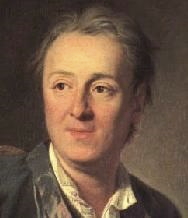
Denis
Diderot (1713-1784)
 Diderot's
major works or writings: Diderot's
major works or writings:
Essai sur
le merite et la vertu (1745)
Pensees philosophiques
(1746)
Lettre sur les aveugles
(1749)
Encyclopedia
Helvitius
(Claude Adrien) (1715-1771)
 Helvitius'
major works or writings: Helvitius'
major works or writings:
De l'esprit
(Essays on the Mind) (1758)
De l'homme (A Treatise
on Man) (2 vols.: 1772)
Jean
Le Rond d'Alembert (1718-1783)
French mathematician, physicist
and philosopher of science. His interests and talents in science
were widely spread – and he wrote extensively for Diderot's Encyclopedia
on various scientific subjects.
 d'Alembert's
major works or writings: d'Alembert's
major works or writings:
Mémoire
sur le calcul intégral (1739)
Mémoire sur
la réfraction des corps solides (1739)
Traité de dynamique(1741)
Traité de l'équilibre
et du mouvement des fluides(1744)
Réflexions
sur la cause générale des vents (1747)
Essai d'une nouvelle
théorie sur la résistance des fluides (1752)
Recherches sur différents
points importants du système du monde (1754-1756)
Eléments de
philosophie (1759)
Eléments de
musique théorique et pratique (1779)
Baron
d'Holbach
 Holbach's
major works or writings: Holbach's
major works or writings:
System of
Nature
Turgot
(1727-1781)
 Turgot's
major works or writings: Turgot's
major works or writings:
Discourse
on the Successive Progress of the Human Spirit
(1750)
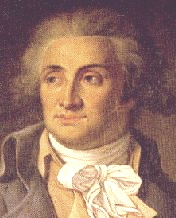
Condorcet
(1743-1794)
 Condorcet's
major works or writings: Condorcet's
major works or writings:
Essai sur
l'application de l'analyse à la probabilité des décisions
rendues
à la pluralité des voix (1785)
(Essay on the Application
of Analysis to the Probability of Majority
Decisions)
Vie de M. Turgot
(1786)
Vie de Voltaire
(1789)
Esquisse
d'un tableau historique des progrès de l'esprit humain (1794)
(Sketch
for an Historical Table of the Progress of the Human Spirit)
|
THE ADVANCE OF REASON AND SCIENCE
(Mid to Late 1700s) |

Thomas
Reid (1710-1796)
Reid was a founding member of
the Aberdeen Philosophical Society and creator of the school of thought
known as Scottish Common Sense Realism.
Adam
Smith (1723-1790)
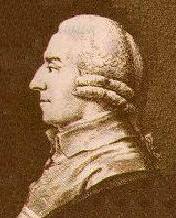
Smith was a Scottish economist,
born in 1723 – and died in 1790.
He early demonstrated strong
philosophical apttudes and was thus in 1740 awarded a scholarship to attend
Oxford University. However his strong devotion to the theories of
Hume brought him constant trouble while at Oxford – and also made difficult
his efforts to secure a teaching job upon graduation (and later, his efforts
to gain professional recognition among fellow academicians).
In 1762 he sttepped down
from his position at Glasgow University to become a tutor – and to begin
the writing of his work, The Wealth of Nations.
In this work he formulated
the key theories of market-driven economics (capitalism). He believed
in an "invisible hand" that would establish a balanced pricing structure
for all goods and services, simply through the natural competition of these
goods and services for buyers in an open or free market. Smith
was strongly opposed to any kind of "intervention" into this market mechanism
by the government or any other "outside" societal institution.
But by the same logic, Smith
was highly opposed to market "insiders" getting together to conspire to
set prices through a witholding of goods of services to create an artificial
scarcity. He was thus opposed to cartels, monopolies, unions.
He considered the danger
of rapid population growth distorting the labor market and driving prices
down to subsistence levels. But he felt that economic growth of the
whole industrial sector would constantly increase the demand for labor
and thus prevent such cruelties from occurring.  Smith's
major works or writings: Smith's
major works or writings:
The Theory
of Moral Sentiments (1759)
The Wealth of Nations
(1776)
Jeremy
Bentham (1748-1832)
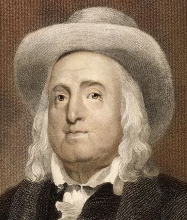
Bentham
is considered to be the founder of British Utilitarianism ... a
philosophy built simply on the idea that "the greatest happiness of the
greatest number is the true measure of right and wrong." In
short, he was a strong advocate in favor of "human rights."
He was highly opposed to slavery, believed in equal rights for women,
was a strong advocate of the separation of church and state, was
opposed to physical punishment, and believed strongly that there
should be no restrictions on speech. He even supported the idea
of animal rights. But he spent his greatest energies on the matter of
prison reform. In short, he was a very "modern" philosopher and
jurist!
But he did not believe that all of these came simply by lifting
traditional Christian moral standards ... as if these "human rights"
would come into place on their own in a rather natural manner (as did
Marx and other philosophers that came after him). To him, human
rights would come only through proper moral and political reform of
society ... enlightened social reform – principally by enlightened
public authority.
Most interesting, someone he would undertake to raise to
these social ideals, John Stuart Mill, would later reject deeply Bentham's
ideas. Mill would disagree strongly with
Bentham that social progress would come best through the process of well-constructed
government action … Mill holding to the later developing idea that social
progress would fare better under personal or private development than under official
governmental action … which to subsequent British Liberals was central to their
idea of the critical importance of personal freedom.
 Bentham's
major works or writings: Bentham's
major works or writings:
Fragment on
Government (1776)
Principles of Morals
and Legislation (1789)
The Theory of Legislation
(1802)
The Book of Fallacies
(1824)
William
Herschel (1738-1822)
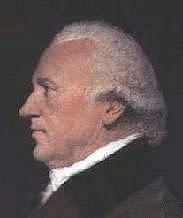
An English astronomer – noted
in his day for the excellence and size of the telescopes he built – and
the careful observations he (with his sister Caroline) made of the heavens.
He began his career as a
musician – but became interested in optics and astronomy early in his career.
Until 1779 this was considered only a side-line – when a member of the Bath
Literary and Philosophical Society discovered his work with telescopes
and invited Herschel to present his work to the Society. He soon
became a member of this Society – and began to devote himself to astronomy.
In 1781 while scanning the
heavens with one of his powerful telescopes, he discovered a new planet
in the solar system – far beyond even Saturn. The Planet came to be
named "Uranus." This discovery brought him entry into the British
Royal Society – and a new position as personal astronomer to King George
III.
It was Herschel who, through
his persistent effort to count stars, came to conclude that the sky was
full of huge disk-shaped wispy clouds which were actually star clusters
of millions of stars each. Our sun was part of such a star cluster – the
rest of which we observed as the Milky Way.
All of this made it very
clear to him that the universe was vastly larger than we hitherto
had even come close to imagining.
Pierre
Simon de Laplace (1749-1827)
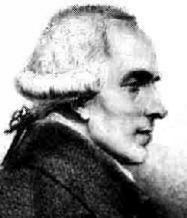
Isaac Newton had outlined the gravitational theories designed to demonstrate that the planets
moved about the sun in accordance to immutable mathematical principles.
There were however still unexplained small variations in Newton's computations:
he had not taken into account the gravitational attraction also working
among the planets themselves. These small variations had the ability
to destabilize the Newton's mechanistic model of the solar system.
But Newton was enough of a mystic to look to God to regulate the small
variations so as to keep the whole system in order.
This idea of a small residual
Divine intervention was not a satisfying concept to Laplace. He understood
the universe to be totally operative under the impersonal laws of nature.
So in 1773 he set out to give full mathematical explanation to the motions
of the heavens – in such a way that there would be no more need to call
in "God" as the residual part of the equation. This he successfully
did through an unprecedentedly in-depth mathematical calculation of the
eccentricities in the planetary orbits – taking into account their gravitation
attraction to each other as well as to the sun as they moved through their
respective orbits. (This work was eventually compiled into the five-volume
study: Traité de mécanique céleste/Celestial Mechanics.)
Laplace's work earned him
a place in the prestigious French Academy of Sciences. It also removed
the idea of God further (if not completely) from the mechanistic cosmology
that had been unfolding over the previous century. Not even deism
could stand up to this assault. Indeed, the story goes that when
Laplace presented a copy of his work to Napoleon, the latter uttered a
concern that Laplace had made no mention in his work of the Divine "Originator"
of this marvelous system – to which Laplace replied: "I had no need
for that hypothesis!"
From his understanding of
the dynamics of the attractions of any particle circling around a central,
attracting point, Laplace speculated that the solar system had come into
being through a similar gravitational force. He theorized in Exposition
du système du monde/The System of the World (1796) that
the cosmos had begun as nebular gas, and the gravitational concentrating
of matter had over the aeons gradually produced a concentrating of this
gas into a number of mass bodies which today make up the solar system.
Over the years of his study
he had worked carefully in developing the "probabilities" of the occurrence
of events over time. His work in this area he published in 1814 as
Essai
philosophique sur les probabilités/A Philosophical Essay on Probability.
In this study he lifted mathematics from an absolutist accounting of events
to a more accurate "probabalistic" accounting of those events. Thus
Laplace became a major contributor to the growing field of statistics.  Laplace's
major works or writings: Laplace's
major works or writings:
Exposition
du système du monde (The System of the World)
(1796)
Traité de mécanique
céleste (Celestial Mechanics)
(5 vols: 1798 - 1827)
Essai philosophique
sur les probabilités
(A Philosophical Essay on Probability)
(1814)
 Eli Whitney
(1765-1825) Eli Whitney
(1765-1825)
American inventor of the cotton
gin and the idea of mass producing parts that could then be used interchangeably
in the production of tools and weapons. |
|
HUMANISM
(Mid to Late 1700s) |
SKEPTICISM / CRITICAL REVIEW OF
REASON
(Mid to Late 1700s) |
David
Hume (1711-1776)
 Hume was a Scottish empiricist – well
known for his skepticism and sharpness of thought. Being a freethinker,
he was easily critical of thinking which rested on no other basis
than traditional argument. He also was sharply critical of thinking
which did not arise from the observation of actual behavior (empiricism)
but which was merely speculative in nature (rationalism). Hume was a Scottish empiricist – well
known for his skepticism and sharpness of thought. Being a freethinker,
he was easily critical of thinking which rested on no other basis
than traditional argument. He also was sharply critical of thinking
which did not arise from the observation of actual behavior (empiricism)
but which was merely speculative in nature (rationalism).
Yet at the same time he was
a quietly confident and serene individual who was deeply comfortable with
the world – and rather conservative in his social and political views.
Even his own skepticism was tempered by his understanding of the human
need for some kind of underpinning of custom or tradition in life.
His major philosophical thrust
was against the rationalists who were prone to build great intellectual
edifices on the foundations of some "self-evident" truths. He considered
such intellectualism as being highly dangerous – likely to lead to polemical
excesses (as the highly intellectually charged revolutions of France in
1789 and Russia in 1917 were certainly to prove in the years after Hume).
To Hume, custom – which was the sum of actual human experience – was the
only healthy foundation on which to build human life.
Being an empiricist, he was
impressed with the patterns by which people actually lived out their lives.
Hume felt that we should pay close attention to the human record of our
actual or "natural" (as he put it) behavior in order to draw conclusions
about life. Hume on the other hand was most unimpressed by the great
intellectual "spins" that philosophers wove around hypothetical behavior
in building their great systems of thought. For Hume reality was
in the doing, not in the hypothesizing about life.
Thus we remember Hume for
his skepticism about our views on God, our great systems of religious truth,
the validity of "objective" ethical systems, even the claims of science
to have established an explanation of all life in terms of cause and effect.
All this was to Hume mere intellectual humbuggery.
Hume's impact lived long
after him. In fact it was Hume that awoke Kant from his "intellectual
slumber" (as Kant himself put it) and caused Kant to undertake the task
of responding to the challenge that Hume had issued to those who would
claim to understand human nature, even life itself. 
 Hume's
major works or writings: Hume's
major works or writings:
A Treatise
on Human Nature (1739)
Essays, Moral and
Political (2 vols.: 1741-1742)
An
Inquiry Concerning Human Understanding (1748)
Political Discourses
(1751)
Five Dissertations
(1756)
Essays
On Suicide And The Immortality Of The Soul
The Natural
History of Religion
Of Tragedy
Of
the Passions
Four Dissertations
(1757)
History of England
(6 vols.: 1754-1762)
Dialogues Concerning
Natural Religion(1777)
Immanuel
Kant (1724-1804)

Complicated in thought but simple
in life-style, Kant – who wrote and taught on a broad range of subjects
from physics to metaphysics, from theology to philosophy – lived out his
life in the relative confines of his hometown of Königsberg, East
Prussia ("Kaliningrad" since its Russian takeover towards the end of World
War Two).
In many ways Kant's intellectual
life was shaped by the challenge that Hume had issued the world a quarter
of a century earlier. In his
Critique of Pure Reason (1781),
Kant agreed with Hume's empiricism – namely that sense-experience is essential
to human knowledge. But he also agreed with the continental rationalists
(most notably Leibniz – whose writings also were a major influence over
Kant) that knowledge is also a matter of the exercise of human reason – in
particular the use of innate human ideas ("categories") which help us to
organize this empirical information. Thus Kant saw himself as closing
the intellectual gap between the British empiricists and the Continental
rationalists.
Kant also saw himself as
answering Hume's skepticism about ever knowing with any degree of certainty
the truth of transcendent ideas, such as moral laws or ethical principles.
In Kant's Metaphysics of Morals (1785) and Critique of Practical
Reason (1788), he proposed a new moral/ethical "categorical imperative,"
one that did not require the existence of God for its validity. And
yet Kant's concept was of a definite transcendant nature, one with absolute
universal validity. It involved an ingenious piece of moral logic:
we ought to act in such a way that our act could become accepted as a universal
principle of behavior. If it were not able to attain such a universal
validity (because, for instance, of an internal contradiction in logic)
then that action, by "practical reason," was obviously not to be pursued.
Taking this logic of "practical
reason" a step further, he turned to the issue of the existence of God.
He agreed with Hume that no rational argument could be given for God's
existence – that is, "pure reason" could not build a case for God's existence.
But "practical reason" could. Pursuing a traditional line of reason
that went back at least as far as Ockham in the early 1300s, Kant claimed
that human reason cannot establish the "fact" of God. But in observing
the moral instincts of people we can see (through the eyes of faith) that
there is some kind of source beyond the mere human will itself
that directs life. That higher moral grounding is by definition God.
Thus God exists. (This kind of theological reasoning did not impress
the Prussian government, which cenured his work).
Finally – so impressed was
Kant that we humans could live in accordance with such higher moral imperatives
that in his Perpetual Peace he laid out a vision for a new world
order. 
 Kant's
major works or writings: Kant's
major works or writings:
Critique of
Pure Reason (1781)
Prolegomena to Any
Future Metaphysics (1783)
Fundamental Principles
of the Metaphysic of Morals (1785)
Critique of Practical
Reason (1788)
The Critique of Judgment(1790)
Perpetual Peace
(1795)
Religion within the
Limits of Reason Alone
|
|
AMERICAN INDEPENDENCE ...
AND THE FRENCH REVOLUTION
(Late 1700s) |
THE EUROPEAN ENLIGHTENMENT:
A FULL HISTORY |

Go on to the next section: The 19th Century
 Miles
H. Hodges Miles
H. Hodges
| | |


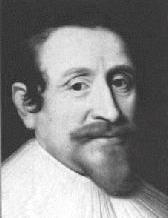 The Dutch jurist, Hugo den Groot
(Grotius) appealed to the European conscience to seek a new spirit of openness
or tolerance about matters of Truth, a broad-mindedness about inquiry concerning
Truth.
The Dutch jurist, Hugo den Groot
(Grotius) appealed to the European conscience to seek a new spirit of openness
or tolerance about matters of Truth, a broad-mindedness about inquiry concerning
Truth.




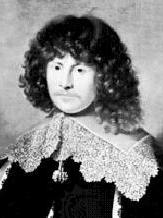













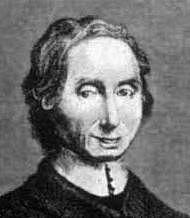





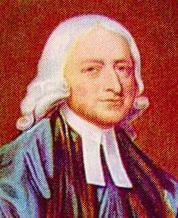
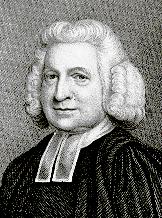
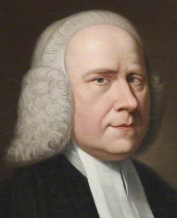













 Eli Whitney
(1765-1825)
Eli Whitney
(1765-1825)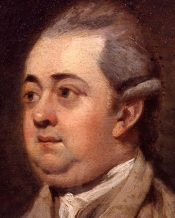 Edward
Gibbon (1737-1794)
Edward
Gibbon (1737-1794)